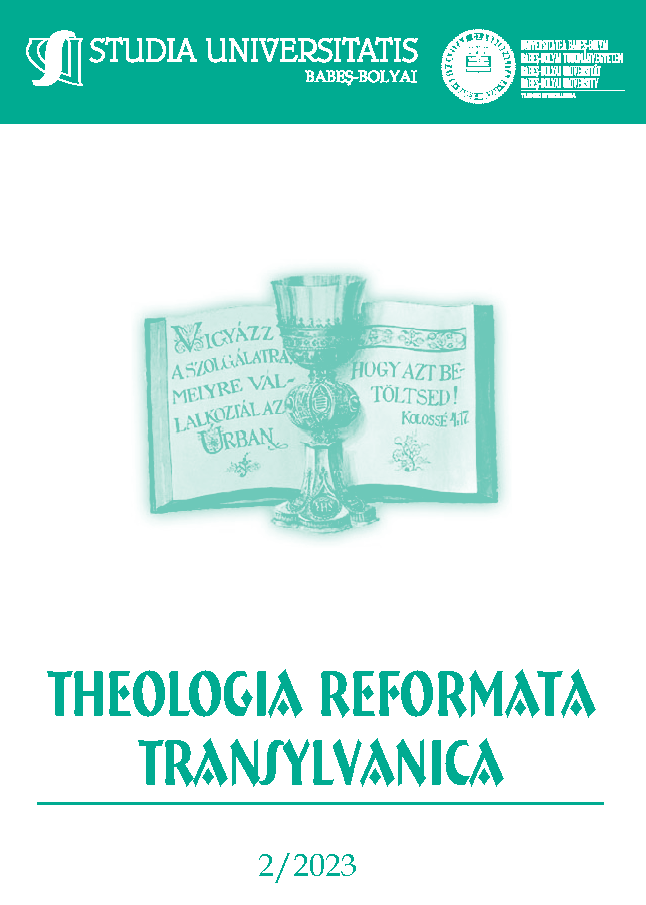Gamifikáció a hitoktatásban
DOI:
https://doi.org/10.24193/subbtref.68.2.13Keywords:
game, gamification, Text Eater, gamification evaluation, religious educationAbstract
Gamification in Religious Education
In its first part, the study describes what definitions were created to define the notion of “game” and what characteristics of it can be observed. The second part shows the place of game itself in religious education, and the reason why it is useful if included in the practice of religious education. The third part revolves around the concept of gamification and points out the differences between games and gamification. The fourth part deals with the applicability of gamification in religious education, in which, in addition to theory, practice also appears. The two authors would like to answer the questions raised in the study Possible Forms of Gamification in School Catechesis published in 2019. On the one hand, with the involvement of the young people of the Reformed Church in Martos, who are preparing for confirmation, the Text Eater program (application) designed for them, which tries to facilitate learning the answers to the questions of the Catechism, is evaluated based on practice. On the other hand, with the involvement of the pupils of the Reformed Elementary School with Hungarian as the Language of Instruction in Martos, the gamification evaluation is assessed pertaining to its use in religious education, as a second potential gamification tool.
References
BAGÓ Sarolta (2016): Egy nemzetközi ifjúsági rendezvény játékosítása, In: TURÓCZI Levente (szerk.): Játsszunk helyesen! A játékpedagógus helye a fiatal segítők társadalmi felelősség-vállalásában. Budapest, Rogers Személyközpontú Oktatásért Alapítvány.
BARABÁSI Tünde (2018): Új módszertani ígéret? Gamifikáció a XXI. századi oktatásban, In: Magiszter. http://padi.psiedu.ubbcluj.ro/wp-content/uploads/Magiszter-20018_1_14-25.pdf (utolsó megtekintés: 2023.02.28.).
CS. SZABÓ Sándor (2008): József köpönyegében. Kiskunfélegyháza, Parakletos Könyvesház.
CSÍKSZENTMIHÁLYI Mihály (2001): FLOW – Az áramlat. A tökéletes élmény pszichológiája. Budapest, Akadémiai Kiadó.
FÓTI Péter (2013): Summerhill..., In: Taní-tani Online. https://www.tani-tani.info/summerhill_majdnem (utolsó megtekintés: 2023.02.22.).
FROMANN Richárd – DAMSA Andrei (2016): A gamifikáció (játékosítás) motivációs eszköztára az oktatásban, In: Új Pedagógiai Szemle. https://folyoiratok.ofi.hu/uj-pedagogiai-szemle/a-gamifikacio-jatekositas-motivacios-eszkoztara-az-oktatasban.
GRASTYÁN Endre (1985): A játék neurobiológiája. Akadémiai székfoglaló előadás, 1983. április 19. Budapest, Akadémiai Kiadó.
HUIZINGA, Johan [é. n.]: Homo Ludens. Szeged, Universum Kiadó.
JUHÁSZ József – SZŐKE István – O. NAGY Gábor – KOVALOVSZKY Miklós (szerk.) (91992): „Játék” [szócikk], In: Magyar Értelmező Kéziszótár. I. Budapest, Akadémiai Kiadó. 617.
MASZLER Irén (1996): Játékpedagógia. Pécs, Comenius Bt.
MYREILLE (2018): A gamifikáció átrajzolja az egész életünket? In: Digitális család. https://www.digitaliscsalad.hu/tanulas/a-gamifikacio-atrajzolja-az-egesz-eletunket (utolsó megtekintés: 2023.02.28.).
N. KOLLÁR Katalin – SZABÓ Éva (szerk.) (2004): Pszichológia pedagógusoknak. Budapest, Osiris Kiadó.
PACSI Diána – SZABÓ Zoltán (2007): A gamifikáció fejlődése és a magyar gamifikációs trend alakulása, In: Studia Mundi – Economica. http://studia.mundi.gtk.szie.hu/gamifikacio-fejlodese-es-magyar-gamifikacios-trend-alakulasa (utolsó megtekintés: 2023.02.28.).
PÉTER Beáta (2010): A játék helye a hitoktatásban, In: Keresztyén Szó. http://epa.oszk.hu/00900/00939/00120/keresztenyszo_EPA00939_2010_10_08.html (utolsó megtekintés: 2023.02.27.).
PINK, Daniel H. (2010): Motiváció 3.0. Ösztönzés másképp. Budapest, HVG Kiadó Zrt.
RIGÓCZKI Csaba (2016): Gamifikáció (játékosítás) és pedagógia, In: Új Pedagógiai Szemle. https://epa.oszk.hu/00000/00035/00175/pdf/EPA00035_upsz_2016_03-04_069-075.pdf (utolsó megtekintés: 2023.02.28.).
SZÁSZ Judit – PÉTER Lilla [é. n.]: Játékpedagógia. Babeș–Bolyai Tudományegyetem, Távoktatási Központ, Pszichológia és Neveléstudományok Kar, Iskola- és Óvodapedagógusi Szak, Székelyudvarhely. https://www.academia.edu/7304902/Jatekpeda20082009 (utolsó megtekintés 2023.02.22.).
SZÉNÁSI Lilla (2019): A gamifikáció lehetséges formái az iskolai katechézisben, In: 11th International Conference of J. Selye University, Theological Sections. http://uk.ujs.sk/dl/3327/SZENASI.pdf (utolsó megtekintés 2023.02.22.).
TURBUCZ Erzsébet (2009): Játék és hitoktatás. Budapest, Magyar Református Nevelés.
Downloads
Published
How to Cite
Issue
Section
License
Copyright (c) 2023 Studia Universitatis Babeș-Bolyai Theologia Reformata Transylvanica

This work is licensed under a Creative Commons Attribution-NonCommercial-NoDerivatives 4.0 International License.



